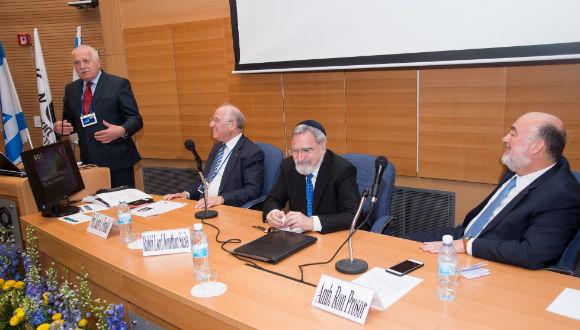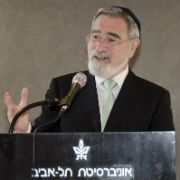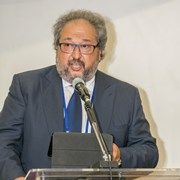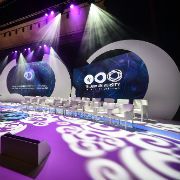BOG 2016: Geopolitical Symposium Debates Global Challenges
In a stimulating discussion moderated by Chairman of the BOG Prof. Jacob A. Frenkel, and held to a full audience in the Raya and Josef Jaglom Auditorium, three acclaimed public figures presented their views on pressing current issues.
Rabbi Lord Jonathan Sacks, a 2016 Honorary Doctorate recipient, spoke on the dangers of Islamic extremism, asking “Why is it that 15 years after 9/11 we haven’t yet won the battle against radical Islam?” Sacks argued that part of the problem lay in “the West’s inability to understand other peoples’ ‘stories.’ In 1989” said Sacks, “three things happened: the Berlin Wall fell, the Soviet Union imploded and the West appropriated the story of ‘The end of ideology, ‘The end of wars’ and the ‘The End of history.’ The problem was that this was the wrong story; elsewhere people were telling a different story,” he said.
“In 1989,” said Sacks, “Ayatollah Khomeni of Iran issued a Fatwa against Salman Rushdie, author of The Satanic Verses. Immediately, the books were burned by Muslims around the world. It was the first time Muslims understood that radical Islam could go global. The West hasn’t understood that story. The real weakness of the West is its inability to defend its values.”
Sacks concluded on a positive note: “I believe we can tell a story which Jews, Christians and Muslims – all children of Abraham – can understand. Let there be no quarrel between us. Let us tell a powerful story of peace.”
Window of opportunity
Ambassador Ron Prosor, former Permanent Representative of Israel at the United Nations, spoke of Israel’s problematic standing at the UN as reflected in the large number of anti-Israel resolutions passed there – “more than any other country,” he stressed. “There are 193 member states, of which only 87 are democracies; 22 out of the 193 are members of the Arab League and 57 from Islamic countries. So the dehumanization of Israel is a question of demand and supply,” said Prosor.
Prosor noted, however, that while the Middle East is disintegrating around us, there is currently a “convergence of interests between Israel and some Arab states as well as a real respect for Israel’s achievements in the field of agriculture and health. There is now a true window of opportunity to change things.”
Communist meltdown
Prof. Václav Klaus, Co- Founder of the Václav Klaus Institute and former President of the Czech Republic spoke on the transformation of the Czech economy from communist to free market capitalism following the Velvet Revolution. “The Communist regime was one of the most oppressive regimes ever,” said Klaus, “but it ceased to exist quietly. No one expected that.”
Klaus noted that in the Czech Republic “we quickly established the machinery of a Parliamentary democracy. We knew that we needed a fundamental change from the old system. We wanted liberal and unregulated capitalism and across the board privatization.” He regretted however, that nowadays in the European Union, “everything had become regulated.”






